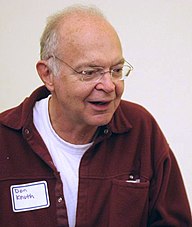D. E. Knuth
| Donald Knuth | |
|---|---|
 |
|
| Born | Donald Ervin Knuth January 10, 1938 Milwaukee, Wisconsin, U.S. |
| Other names | simplified Chinese: 高德纳; traditional Chinese: 高德納; pinyin: Gāo dé nà |
| Nationality | American |
| Fields |
Mathematics Computer science |
| Institutions | Stanford University |
| Alma mater |
Case Institute of Technology (B.S., M.S.) California Institute of Technology (Ph.D.) |
| Thesis | Finite Semifields and Projective Planes (1963) |
| Doctoral advisor | Marshall Hall, Jr. |
| Doctoral students | |
| Known for |
The Art of Computer Programming TeX, METAFONT Knuth–Morris–Pratt algorithm Knuth–Bendix completion algorithm MMIX Robinson–Schensted–Knuth correspondence |
| Notable awards |
|
|
Website cs |
|
Donald Ervin Knuth (/kəˈnuːθ/kə-NOOTH; born January 10, 1938) is an American computer scientist, mathematician, and professor emeritus at Stanford University.
He is the author of the multi-volume work The Art of Computer Programming. He contributed to the development of the rigorous analysis of the computational complexity of algorithms and systematized formal mathematical techniques for it. In the process he also popularized the asymptotic notation. In addition to fundamental contributions in several branches of theoretical computer science, Knuth is the creator of the TeX computer typesetting system, the related METAFONT font definition language and rendering system, and the Computer Modern family of typefaces.
As a writer and scholar, Knuth created the WEB and CWEB computer programming systems designed to encourage and facilitate literate programming, and designed the MIX/MMIX instruction set architectures. Knuth strongly opposes granting software patents, having expressed his opinion to the United States Patent and Trademark Office and European Patent Organisation.
...
Wikipedia
